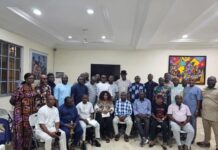Rivers State was once again thrown into a state of shock and apprehension after twin explosions shook two prominent locations in Port Harcourt on the early morning of October 5, 2024. This latest escalation in violence is not just a random occurrence but a disturbing sign of rising tensions and deepening political instability in the state.
The Rivers State Police Command confirmed that two separate explosions, nearly simultaneous, occurred within minutes of each other. The first explosion targeted the All Progressives Congress (APC) Secretariat along Aba Road, while the second explosion struck the Obio/Akpor Local Government Secretariat, just on the outskirts of Port Harcourt. These deliberate attacks have left citizens fearing for their safety and wondering if the government is losing its grip on security in this oil-rich yet volatile region.
Anatomy of the Explosions: What We Know So Far
At approximately 3:00 AM, a thunderous explosion ripped through the APC Secretariat on Aba Road, jolting nearby residents out of their sleep. According to reports, a lone security guard stationed at the secretariat had heard a loud bang, only to witness three black Toyota Hilux vans speeding away from the scene. Within moments, the gate of the building lay in ruins, windows were shattered, and the security building was engulfed in flames. The nature of the attack left little doubt that this was a well-coordinated strike.
Thirty minutes later, at 3:30 AM, another blast was reported—this time at the Obio/Akpor Local Government Secretariat. Eyewitnesses noted the presence of two vehicles, a black Toyota Hilux van and a white Toyota Sienna minivan, driving past the building before an object, suspected to be a stick of dynamite, was hurled towards the secretariat. The explosion caused extensive damage to the roof and generator house of the complex.
Grace Iringe-Koko, the spokesperson for the Rivers State Police Command, provided details of the explosions in an official press release. “The Rivers State Police Command was alerted to two explosions that rocked the city of Port Harcourt on Saturday, 5 October 2024…An improvised explosive device was recovered at the APC Secretariat, and the team identified the use of incendiary materials in the arson of the security building.”
The police have mobilised units, including the Explosive Ordnance Disposal and Anti-Bomb Squad, to both locations to investigate. Samples have been collected for forensic analysis, and an intensive search for the perpetrators is underway. Yet, despite these swift responses, the question on everyone’s lips is: Why is Rivers State repeatedly falling victim to such acts of violence, and who stands to benefit from these growing tensions?
The Political Context: A State in Crisis?
To fully understand the gravity of these twin explosions, one must delve into the political backdrop of Rivers State—a cauldron of political rivalry, ethnic tensions, and incessant power struggles. The state has been embroiled in a bitter battle between the All Progressives Congress (APC) and the ruling People’s Democratic Party (PDP), with every election cycle triggering a dangerous escalation in violence.
These twin explosions, though not directly tied to any political group at the moment, raise troubling questions about the lengths to which various actors are willing to go to secure political power in Rivers State. Could these explosions be a message? A harbinger of more violent confrontations over the 2024 Local Government Elections?
Already, Rivers State Governor Siminalayi Fubara has traded accusations with the APC and PDP in recent months, each accusing the other of sowing chaos to discredit one another. The blast at the APC Secretariat seems more than just a random act of vandalism—it appears to be a deliberate attempt to cripple one of the key political parties in the state.
The targeting of the Obio/Akpor Local Government Secretariat—a key administrative hub—suggests that the perpetrators are seeking to disrupt not just political activities but also local governance. Could this be an effort to destabilise the activities of political parties in the state? Grace Iringe-Koko’s statement emphasised the seriousness of the incidents, calling them “heinous acts” meant to incite fear and instability.
The Explosions and Election Interference: Is Democracy at Risk?
It is no secret that Rivers State’s elections are often marred by violence, vote-rigging, and allegations of corruption. This latest incident involving the APC Secretariat and the Obio/Akpor Local Government Secretariat points to a familiar pattern of violence being deployed as a tool for political advantage.
In Rivers State, power is often contested not in the ballots but in the streets. Election-related violence has claimed numerous lives over the years, with political thugs and militia groups frequently hired to suppress voter turnout, intimidate opposition supporters, and disrupt the electoral process. These twin explosions could be viewed as an ominous sign of things to come as the 2027 elections draw nearer.
The simultaneous nature of the explosions is particularly chilling. It indicates a level of coordination that suggests these were not amateur attacks but the work of a well-organised group with the resources and capability to strike multiple locations in a short period. Could this be a sign that militant groups, who have often been used as political enforcers in the Niger Delta region, are re-entering the fray?
These explosions may be part of a broader strategy to disrupt the local government elections which RSIEC conducted in defiance of a Federal High Court order, further destabilising an already fragile democratic process. As voters headed to the polls, the fear of violence greatly suppressed voter turnout, giving an advantage to those willing to use chaos as a weapon of political control.
Security Lapses: Is the Government Failing to Protect the People?
The twin explosions are also a stark reminder of the increasingly fragile security apparatus in Rivers State. Despite the deployment of police units and anti-bomb squads, there are growing concerns about the government’s ability to protect critical infrastructure and prevent these kinds of attacks.
This incident is not isolated. In recent years, Rivers State has seen a worrying rise in bombings, assassinations, and politically motivated attacks. The failure of the state government to address these security challenges has left many questioning whether the political leadership in the state is complicit, incompetent, or simply overwhelmed by the scale of the problem.
There have been repeated calls for increased security around political party offices, local government secretariats, and electoral facilities. Yet, the attacks on both the APC Secretariat and the Obio/Akpor Local Government Secretariat reveal a serious lapse in intelligence gathering and proactive policing. How could a group of individuals, armed with explosives, move through the streets of Port Harcourt without detection? How were these attacks not anticipated, especially given the high stakes of the upcoming elections?
Grace Iringe-Koko’s statement, though assuring residents that “every possible measure is being taken to enhance security,” has done little to quell public anxiety. The Rivers State Police Command may be scrambling to catch the culprits, but the fact remains that the damage has been done. The security forces have once again been caught on the back foot, reacting to violence rather than preventing it.
The Spectre of Militancy: A Return to the Dark Days?
The Niger Delta region, of which Rivers State is a part, has a long history of militancy. For years, armed groups in the region fought for a share of the region’s vast oil wealth, engaging in kidnapping, pipeline bombings, and attacks on security forces. While militancy has largely subsided due to government amnesty programs, there are growing fears that these groups may be reawakening, driven by political patronage or renewed grievances.
The use of explosives in these latest attacks is a disturbing development that echoes the tactics used by militant groups in the past. Could the twin blasts be a sign that former militants are being re-armed by political actors, desperate to win control of Rivers State’s lucrative local governments?
With the 2024 elections fast approaching, the stakes are high, and the potential for militant resurgence is a frightening reality. The APC Secretariat bombing and the Obio/Akpor Local Government attack may just be the opening salvo in a broader campaign of violence designed to disrupt the political process and secure electoral victories through intimidation.
What’s Next? The Future of Security and Politics in Rivers State
As Rivers State grapples with the aftermath of these twin explosions, the stakes for future elections have never been higher. These attacks have laid bare the fragility of the state’s political and security apparatus, raising fears that the violence will only escalate in the coming weeks.
The government must take swift and decisive action to restore public confidence in its ability to maintain order. This will require more than just reactive policing—it will necessitate a comprehensive strategy to address the root causes of political violence, from corruption and political patronage to the reemergence of militant groups.
For the people of Rivers State, the message is clear: their democracy is under threat, and their leaders must act now to prevent further bloodshed.











